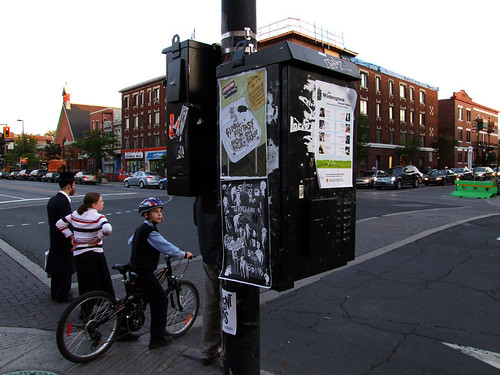
Posters on a traffic control box, including an election sign
The ongoing school board election in Montreal has revealed, as with every election, an unacceptable double-standard in Montreal’s attitude towards postering. While politicians have the right to plaster the city with their campaign signs, virtually no legal space has been set aside for community groups, musicians, artists, and other individuals and low-budget organizations to make themselves heard.
Like it or not, posters give them a chance to effectively target a local audience that might not otherwise be reached. It’s a medium that is unfiltered, flexible and, above all, inexpensive. Most importantly, postering allows a diversity of voices to be heard in the streets. To restrict it is to infringe upon nothing less than our fundamental right to free speech. I’m not being grandiose: this is the opinion of the Supreme Court of Canada, which ruled in 1993 that Canadian municipalities cannot legally prohibit postering on public property. “Postering on public property, including utility poles, clearly fosters political and social decision‑making,” the court declared. A ban on postering, it continued, constitutes a “complete denial of access to a historically and politically significant form of expression.”
Cities are free, however, to regulate postering. Some take a more progressive approach than others. Vancouver, for instance, places casts around its lampposts to which anyone can staple a poster. They’re removed every week by city workers. In Calgary, major streets like 17th Avenue have abundant postering space in the form of kiosks and special walls dedicated to posters.
In Montreal, though, the city has failed to provide any significant amount of legal postering space. In the 1980s, an advertising firm called Publicité sauvage won the right to place bills on construction hoardings; today, though, it monopolizes these spaces with commercial advertising, leaving few alternatives to most groups and people. In the Quartier des spectacles, a few metal posts have been provided for posters. In Lachine, the borough has erected poster kiosks along its main streets. But in most of Montreal, especially in the cultural hubs of downtown and the Plateau, people are forced to post their bills illegally on lampposts, postboxes and traffic control boxes.
Postering is a medium used by a vastly diverse array of people. Throughout the year, hundreds of independent musicians advertise their concerts with visually striking gig posters designed by artists such as Jack Dylan, whose work has been shown in galleries across Canada. Community groups user posters to announce important meetings. Political groups use them to make a statement. When some people were angered last spring by the rise in parking rates, they made themselves heard by putting posters on lampposts and parking meters across town.
Posters are uniquely flexible medium, too: last year, within an hour of the shootings at Dawson College, posters directing students to a safe space at Concordia were taped to lampposts all over downtown.
Montreal has an obligation to provide enough legal space for its citizens to make themselves heard. It could start by identifying the streets with the highest volume of posters, such as Milton in the McGill Ghetto, St. Viateur in Mile End or St. Laurent on the Plateau, and then copy Vancouver’s approach by putting a cast around existing lampposts.
Or it could do something even cheaper: allow people to stick posters to the traffic control boxes that are found at every single traffic light in town. Many of these ubiquitous black boxes are already covered in posters; why not legalize what’s already happening?


One comment
Every city should look at their legal postering spaces and do more to provide it. It’s the best way to get people to find out about things going on where they live and get involved in their own city, rather than just living in their own bubble. It’s also a great medium for grass-roots movements to get their message out.
Kitchener-Waterloo, Ontario, is really lousy for legal postering space, but there’s a group of people there known as the Poster Brigade. You make posters of anything you want people to see, and you spend a night plastering others’ posters up in exchange for them doing the same with yours. It’s a really great way of getting to people.